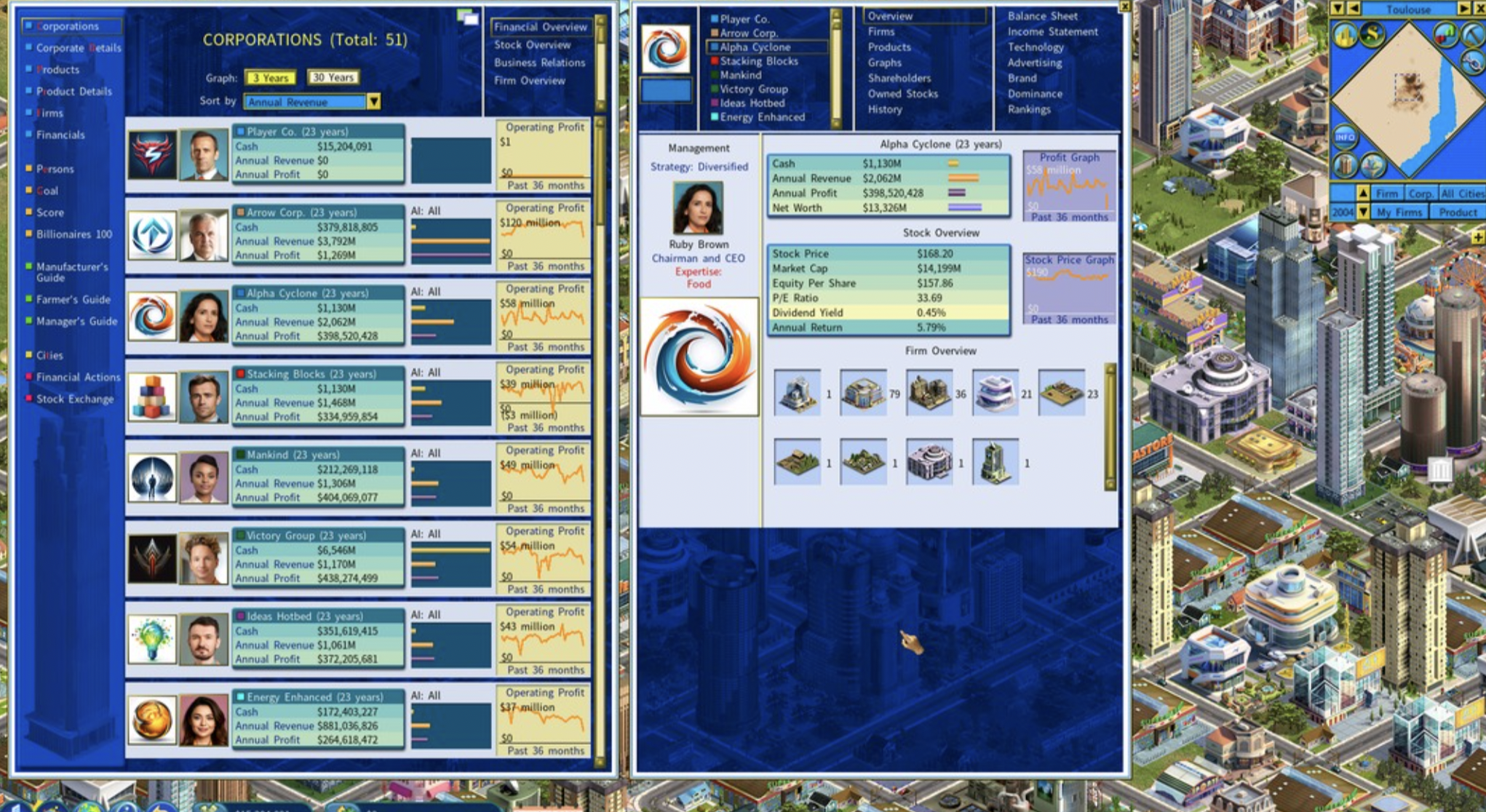Gamification in education is a rising trend, and I am excited about it. The market is expected to reach over $30 billion by 2025 (Source). Given this significant rise, I decided to explore some business games that teachers could use to teach the next generation of entrepreneurs and investors. And I found some pretty great finds.
These business games provide an excellent way for students to learn business skills. Students can engage in activities like managing virtual companies and participating in simulated stock trading.
Further, by offering a risk-free environment, these games can facilitate the development of students’ entrepreneurial mindset and financial acumen.
And I can’t forget to mention that there are plenty of stats citing their impact:
- Challenge-based gamification in education leads to an increase of 34.75% in student performance (Source).
- Furthermore, students who were educated with challenge-based gamification performed better by up to 89.45% compared to those who only received lectures (Source).
- 67% of students found gamified learning more motivating and engaging than traditional courses (Source).
So, what are you waiting for? Below are some of the games that I found while researching. From simulation to stock traders to card games, there are plenty of interesting games to discover.
Are you more interested in entrepreneurial games? Check out our list of great entrepreneurship games.
1. Products: The Card Game (Top trending pick)

Products: The Card Game teaches students how to pitch and invent products. The game is easy to play. Every round, an investor draws a Product card. Then, all the players have a handful of Feature cards to pitch as additions to the Product. By combining the cards, you end up pitching products like a “television for your BBQ set.” And it gets intense! Expect much shouting and arguing as people give their case to the investor.
Why I like it: It’s a quick and fun way to teach the class about inventing and entrepreneurship while being goofy. And it’s all in-person, so there are no phone and laptop screens to play.
Pros
- Encourages students to think outside the box.
- Get to practice pitching ideas and communication.
- A light-hearted approach to learning about inventing/entrepreneurship.
- Fosters teamwork and collaboration for large groups.
Cons
- Does not delve into complex aspects like financial planning or market research.
- Pitches may be won more for humor than practicality.
2. Monopoly (Top classic pick)

This classic board game teaches students to manage finances, make strategic decisions, and understand investments.
Why I like it: It’s a classic! Most students will already know how to play, and it is a great way to learn about business basics in a fun and interactive way.
Pros
- Teaches concepts like budgeting, investing, and managing money.
- Requires strategic thinking for property acquisition, negotiation, and risk management.
- Get a hands-on, competitive learning experience.
- It is a timeless classic.
Cons
- The gameplay can be LONG.
- Students will likely get frustrated or annoyed.
- It tends to oversimplify more complex principles.
- It is fairly repetitive (i.e., roll, buy, repeat).
3. SimCity (Top economic pick)

In this simulation game, students can build and manage their own virtual city, making decisions about zoning, infrastructure, and budgeting.
Why I like it: It’s a great way to learn about urban planning and economic development.
Pros
- Provides education for city development, infrastructure management, and local economics.
- Foster critical thinking in a risk-free environment.
- Can customize scenarios with different city layouts.
- Offers a visual representation of urban development.
Cons
- The complexity can be overwhelming.
- Significant learning curve to grasp the game
- It doesn’t cover a wide variety of business aspects.
- Students may prefer building aesthetics versus learning.
4. Lemonade Stand (Top simple pick)

This simple online game allows students to run their own virtual lemonade stand, learning about pricing, marketing, and inventory management.
Why I like it: It’s a fun introduction to the basics of entrepreneurship.
Pros
- It is simple easy-to-understand:
- Gives hands-on experience in pricing, marketing, and inventory management.
- It is a realistic display of challenges faced by small businesses.
- The game encourages ane engages. active participation.
Cons
- The game focuses only on a lemonade stand.
- Does not go over many advanced business concepts.
- The gameplay is fairly repetitive.
- Limited opportunities for team and collaboration.
5. Capitalism Lab (Top virtual pick)

This business simulation game allows students to run their virtual company, making production, marketing, and finance decisions.
Why I like it: It’s an exciting way to learn about the complexities of running a business in a competitive market.
Pros
- It is a comprehensive business simulation covering product, marketing, finance, and research.
- Learn about business ops and market dynamics through simulated gameplay.
- Players have to be strategic with their business strategies
- Provides educational value for entrepreneurship and business management.
Cons
- It has a steep learning curve.
- Overwhelming for beginners.
- It can be very time-consuming:
- Focuses primarily on single-player gameplay.
6. Stock Market Game (Top stock market pick)

The Stock Market Game allows students to simulate investing in the stock market. They can learn about the basics of trading, risk management, and portfolio diversification. I think it is an excellent pick for financial-minded students!
Why I like it: I find this game great for students with a knack for financial concepts.
Pros
- It simulates real-life markets.
- Provides risk-free practice.
- Offers tutorials to help students learn.
- The game uses real-time live data
Cons
- The game can oversimplify market dynamics.
- Focuses on short-term trading versus long-term trading.
- Primarily focuses on stock trading.
- The game prioritizes individual performance over group teamwork.
7. Biz Builder Delux (Top retail pick)

In this mobile game, students can build and manage their virtual retail store, learning about customer service, inventory management, and marketing.
Why I like it: I think it is an excellent way to learn about the retail industry.
Pros
- Students can learn outside the classroom.
- Experience in managing retail stores, customer service, inventory management, and marketing.
- Offers real-world challenges and decisions owners face.
- Keeps students motivated and investing in virtual businesses.
Cons
- The game includes in-app purchases.
- Overlooks aspects outside of retail management.
- Constrained by smaller screen size.
- Games may detract from other learning.
8. Airlines Manager: Tycoon (Top airline pick)

In this simulation game, students can run their virtual airline, making decisions about routes, pricing, and fleet management.
Why I like it: I love how this simulation game allows students to run their virtual airline,
Pros
- Covers airline complexities: route planning, pricing, and fleet management.
- Immerses in aviation challenges.
- Prompts informed choices for optimizing operations.
- Provides insights into aviation economics, logistics, and customer service.
Cons
- It may overwhelm new students due to its complexity.
- Requires significant time, with lengthy sessions.
- Access may be limited for some students.
- Focuses solely on airlines, possibly neglecting broader concepts.
9. Coffee Shop Tycoon (Top small business pick)

This simulation game allows students to run their virtual coffee shop, learning about customer service, menu planning, and budgeting.
Why I like it: I think it is a great way to learn about the food and beverage industry.
Pros
- Focuses on coffee shop business: menu planning, service, budgeting.
- Learn about active management.
- Realistic portrayal: sourcing, staff management.
- Offers engaging, immersive experience.
Cons
- It focuses solely on the coffee shop business, potentially neglecting broader entrepreneurship.
- Simplifies coffee shop management, reducing comprehensive understanding.
- Gaming distractions may reduce learning outcomes.
- Limited availability on specific platforms limits accessibility.
10. The Sims (Top competitive pick)

In this simulation game, students can create and manage their virtual businesses, from restaurants to fashion boutiques, to see how they fare in the competitive market. Of course, this is only one aspect of the entire Sims game.
Why I like it: I’m excited about The Sims because in the game, students can create and manage virtual businesses, such as restaurants and fashion boutiques, giving them a firsthand taste of the competitive market. However, the game is probably unsuitable for a class environment, as the business component is only a piece of the larger game.
Pros
- It exposes students to a variety of industries.
- It demonstrates business operations, including staffing and budgeting.
- Provides extensive tools for designing businesses.
- It engages and fosters critical thinking skills.
Cons
- Covers multiple industries, potentially sacrificing depth.
- Non-educational elements may reduce focus.
- Lengthy sessions require significant time investment.
- The open-ended nature may divert from learning goals.
11. RollerCoaster Tycoon (Top theme park pick)

Test your business skills by designing and managing your own amusement park, from setting ticket prices to hiring staff and keeping customers happy.
Why I like it: I love this simulation game because it lets students explore their creativity and decision-making skills in managing their amusement park.
Pros
- You can design and customize amusement parks for creativity.
- Students learn about pricing, finances, and customer satisfaction for success.
- Understand the entrepreneurship challenges of an amusement park.
- Make critical decisions for profit maximization.
Cons
- Lengthy sessions require significant time investment.
- Mechanics may overwhelm some players, especially newcomers.
- Primarily focuses on theme parks, potentially neglecting broader business concepts.
- Immersive nature may distract from educational objectives.
12. Game Dev Tycoon (Top gaming pick)

Step into the shoes of a game developer and build your own successful gaming company by creating and releasing hit games while managing finances and marketing strategies.
Why I like it: I’m drawn to Game Dev Tycoon because it realistically portrays the challenges faced by game developers, such as adapting to genre trends and achieving critical acclaim.
Pros
- Gain insights into game design, marketing, and financial management.
- Understand both the challenges and rewards of starting and running a gaming company.
- Offers decision-making, such as game development, staffing, and business expansion.
- The game offers a realistic portrayal of the video game industry.
Cons
- Limited relevance for students interested in other industries.
- Gaming distractions may lead to off-task behavior.
- Lengthy sessions require significant time investment.
- Focus on the video game industry may overlook broader business aspects.
13. Capitalism II (Top complex pick)

This complex business simulation game challenges players to build and expand their own business empire, from manufacturing to retail, while navigating economic trends and competition.
Why I like it: I like how comprehensive the game is and how it provides insights into the complexities of running a business.
Pros
- Covers various industries instead of one.
- Players must build business empires and navigate economic trends.
- It offers insights into the complexities of running a business.
- The game shows basic economic principles.
Cons
- Advanced mechanics may be daunting for inexperienced players.
- Lengthy sessions require significant time investment.
- Less accessible to students without prior knowledge.
- Depth may overwhelm players, detracting from the learning experience.
14. Railroad Tycoon (Top logistics pick)

Manage and expand a railway empire by building tracks, purchasing locomotives, and making strategic decisions to outmaneuver competitors and dominate the transportation industry.
Why I like it: I enjoy how in-depth they went into the railroad industry, and it makes me feel like I am a robber-barron or some mid-century railroad titan.
Pros
- Insights into the transportation industry: railway management, logistics, infrastructure.
- Challenges strategic decision-making: route planning, locomotive purchasing.
- Realistic portrayal of railroad tycoon challenges, practical insights.
- Learn about transportation evolution and economic development.
Cons
- Primarily focuses on the railroad industry, potentially neglecting broader concepts.
- Includes industry-specific terminology, may be unfamiliar or confusing.
- Lengthy sessions require significant time investment.
- Immersive nature may lead to distractions.
15. Theme Hospital (Top medical pick)

Test your business acumen by managing a hospital, from hiring staff and treating patients to balancing budgets and expanding facilities to keep the hospital running smoothly.
Why I like it: I thought this one was very interesting, especially from a managerial perspective.
Pros
- Insights into the healthcare industry: hospital management, patient care, budgeting.
- Challenges strategic decision-making: staff hiring, facility expansion, patient satisfaction.
- Realistic portrayal of hospital administration challenges, practical insights.
- Encourages problem-solving to keep the hospital running smoothly.
Cons
- Focuses solely on healthcare, potentially limiting relevance.
- Lengthy sessions require significant time investment.
- Complexity may overwhelm players, detracting from learning.
- Less accessible to students without prior knowledge.
16. Zoo Tycoon (Top animal pick)

Build and manage your own zoo by creating habitats, caring for animals, and attracting visitors to generate revenue and grow your business in this fun and engaging simulation game.
Why I like it: What is there not to like about Zoos! It’s a pretty fun game.
Pros
- Insights into zoological industry: zoo management, animal care, visitor attraction.
- Allows creative expression: design and customize zoos for creativity.
- Realistically portrays challenges faced by zookeepers, practical insights.
- Teaches animal conservation, habitat design, wildlife management.
Cons
- Focuses solely on zoo industry, potentially neglecting broader concepts.
- Lengthy sessions require significant time investment.
- Immersive nature may lead to distractions from educational objectives.
- Less accessible to students without prior knowledge of zoo management.
17. Restaurant Empire (Top restaurant pick)

Experience the challenges of running a successful restaurant business, from designing menus and managing staff to dealing with food critics and competing with rival eateries to become a culinary mogul.
Why I like it: This is probably one of the more challenging ones. Good thing I am a good cook.
Pros
- Insights into menu planning, staff management, and customer service.
- Hands-on restaurant management experience: practical insights.
- Portrays restaurant operations realistically.
- Teaches business strategy, marketing, and competition.
Cons
- Focuses solely on restaurant industry, potentially neglecting broader concepts.
- Lengthy sessions require significant time investment.
- Immersive nature may lead to distractions.
- Non-educational gameplay elements may reduce engagement.
18. Wall Street Survivor (Top finance pick)

This online investing game offers a realistic stock market simulation with virtual trading, research tools, and educational resources. Players can compete in leagues and challenges to hone their investing skills.
Why I like it: I enjoy the realism. It is kind of like fantasy football for investing.
Pros
- Learn about virtual trading, research tools, and educational resources.
- It lets students engage in decision-making and problem-solving.
- Provides supplementary materials for understanding investing.
- Students can compete to hone their skills.
Cons
- Simplified simulation may oversimplify market dynamics.
- Emphasis on short-term gains may not align with sound practices.
- Primarily focuses on stocks, neglecting other opportunities.
- Individualistic focus may reduce teamwork.
19. Startup Company (Top startup pick)

In this game, players are tasked with building and growing their tech startup, from hiring employees to developing new products and securing funding.
Why I like it: As someone who has been in startups, I can appreciate the attention to detail in this game.
Pros
- Contains real-world business obstacles like competition, providing practical learning.
- Students have to make strategic decisions on operations and product development.
- Learn insights into team management, hiring, and training.
- Immersive startup journey fosters entrepreneurial spirit.
Cons
- Simplified simulation may overlook business intricacies.
- Primarily focuses on startup challenges, neglecting broader concepts.
- Limited scalability may hinder the learning of advanced concepts.
- Gaming distractions may reduce focus on learning objectives.
20. Entrepreneur: The Beginning (Top old school pick)

In this game, players start their businesses and must navigate challenges such as competition, market fluctuations, and employee management.
Why I like it: This is a very general and old game. I included it in the picks for nostalgia.
Pros
- Encounter real-world business obstacles like competition.
- Make strategic decisions on operations, product development.
- Insights into team management, hiring, and training.
- Immersive startup journey fosters entrepreneurship.
Cons
- May overlook business intricacies.
- Primarily focuses on startup challenges, neglecting broader concepts.
- Limited scalability may hinder the learning of advanced concepts.
- Gaming distractions may reduce focus on learning.
21. Rise of Industry (Top industrial pick)

Players take on the role of a budding entrepreneur in the early 20th century, building and managing their industrial empire.
Why I like it: This game is really fun. However, it has a bit of a learning curve, and I am not sure how to incorporate it into my classes.
Pros
- Set in the early 20th century, insights into industrialization and economic development.
- Challenges players to build and manage industrial infrastructure.
- Teaches about supply chain management and production optimization.
- Encourages strategic decisions for growing industrial empire.
Cons
- It focuses on a specific historical period, potentially limiting relevance.
- The steep learning curve for inexperienced players.
- The lack of modern context may limit applicability to present-day entrepreneurship.
- Gaming distractions may reduce focus on learning.
22. Project Highrise (Top real estate pick)

This game challenges players to design and manage a skyscraper, making decisions on everything from tenant selection to building maintenance.
Why I like it: Real estate is an exciting thing to try out and play around with.
Pros
- Insights into urban planning and property management.
- Teaches real estate economics: property valuation and rental income.
- Challenges in facility management: building maintenance, tenant satisfaction.
- Allows creative skyscraper design, fostering architectural appreciation.
Cons
- Focuses on property management and skyscraper construction, potentially neglecting broader concepts.
- Lengthy sessions require significant time investment.
- Limited scalability may hinder learning beyond single skyscraper.
- Gaming distractions may reduce focus on learning.
23. Mad Games Tycoon (Top studio pick)

Players run their game development studio, managing everything from hiring staff to marketing their games to success.
Why I like it: Okay. Running a game development studio is a lot of fun but also a lot of work. I enjoyed all the challenges. I think students could learn a lot from the game.
Pros
- Experience the challenges and rewards of running a game development studio.
- Make critical decisions about game design, staffing, and expansion.
- Unleash creativity by designing and producing virtual games.
Cons
- Gaming distractions may overshadow learning objectives.
- Lengthy sessions require significant time investment.
- Lack of broader business context.
24. Merchant (Top historical pick)

In this game, players act like a medieval merchant, buying and selling goods to build a successful trading empire.
Why I like it: I liked how it took me back in time. It showcases almost the beginnings of trading and markets. The game might be good for an economic class.
Pros
- Set in a medieval setting, insights into historical trading practices.
- Teaches about supply and demand, pricing strategies, and market fluctuations.
- Challenges in navigating risks such as piracy and economic downturns.
- Opportunities for cultural exploration and understanding.
Cons
- It focuses on a specific historical period, potentially limiting relevance.
- May oversimplify aspects of medieval trade.
- A lack of modern context may limit applicability.
- Gaming distractions may reduce focus on learning.
25. Investopedia Simulator (Top real-world pick)

Investopedia offers a free stock market simulator that allows players to practice trading stocks, options, and other securities in a risk-free environment. It’s a great way to learn about investing and test out different strategies.
Why I like it: This game is fantastic for a personal finance class. It is a risk-free brokerage account, and they have this challenge where you can try to beat Warren Buffet.
Pros
- Realistic portrayal of the stock market, allowing practice in trading various securities.
- Risk-free environment for experimenting with investing strategies.
- Supplementary materials and tutorials for understanding investing concepts.
- Incorporates up-to-date market data for a dynamic investing experience.
Cons
26. MarketWatch Virtual Stock Exchange (Top investing pick)

MarketWatch’s virtual stock exchange game allows players to trade stocks, options, and mutual funds using real-time market data. Players can compete against friends or join public leagues to test their investing prowess.
Why I like it: I think this game would be great for a high school or collegiate class. It is another pick that would be fun, like a Fantasy football league.
Pros
Cons
- May oversimplify market dynamics and investment strategies.
- Emphasizes short-term trading over long-term principles.
- Primarily focuses on stocks, neglecting other investment opportunities.
- Gaming distractions may reduce focus.
27. Wealthbase (Top social pick)

Wealthbase is a social investing game that allows players to create virtual investment clubs with friends or join public leagues to compete against others. Players can trade stocks, ETFs, and cryptocurrencies to see who can build the most profitable portfolio.
Why I like it: I have always wondered if students could form finance or investing clubs in high school. Instead of trading $100 on a small brokerage and putting it all into meme stocks, I bet they could have fun doing group portfolio-building.
Pros
- Social investing with virtual clubs or public leagues fosters collaboration.
- Realistic portrayal of the stock market, trading stocks, ETFs, and cryptocurrencies.
- Provides educational resources for understanding investing concepts.
- The competitive element adds excitement to the learning experience.
Cons
- May oversimplify market dynamics and investment strategies.
- Emphasizes short-term trading over long-term principles.
- Primarily focuses on stocks, ETFs, and cryptocurrencies.
- Gaming distractions may reduce focus on learning objectives.
Interested in more innovation activities? Check out our recent review of some of the top innovation activities.
FAQ: Business Games for Students
1. What are business games for students?
Business games for students are interactive simulations designed to mimic real-world business scenarios. They allow students to play the role of entrepreneurs, managers, or investors and make decisions that affect the success of their virtual ventures.
2. How do business games benefit students?
Business games offer numerous benefits for students. They provide hands-on experience in key business concepts such as decision-making, strategic planning, financial management, and teamwork. Additionally, these games encourage critical thinking, problem-solving, and creativity in a risk-free environment.
3. Are business games suitable for all ages and skill levels?
Many business games are designed to accommodate various age groups and skill levels. Some games offer simplified mechanics and tutorials for beginners, while others provide more complex simulations for advanced players. Educators can choose games that align with their students’ proficiency levels and learning objectives.
4. Can business games be integrated into the classroom curriculum?
Absolutely! Many educators incorporate business games into their curriculum to enhance learning outcomes. These games can be used as supplementary tools to reinforce classroom lessons in business studies, economics, finance, and entrepreneurship. They can also be used for group activities, projects, or competitions to promote student collaboration and engagement.
5. How can students access business games?
Business games are available on various platforms, including computers, tablets, and smartphones. Some games can be downloaded as apps from app stores, while others are accessible through web browsers. Additionally, educational institutions may have subscriptions to gaming platforms or provide access to specific games through their learning management systems.
6. Are there any costs associated with playing business games?
While some business games may require a one-time purchase or subscription fee, many educational versions are free or discounted for students and educators. Additionally, students can often access trial or limited-feature versions at no cost. Educators should explore different options to find games that fit their budget constraints.
7. How can educators ensure that business games align with learning objectives?
Before integrating business games into the curriculum, educators should evaluate the content and features of each game to ensure alignment with specific learning objectives and educational standards. They can also develop lesson plans, assignments, or assessments that complement the game experience and reinforce key concepts covered in the game.
8. Are there any student safety and privacy considerations when using business games?
Educators should prioritize student safety and privacy when using business games in the classroom. It’s essential to choose reputable games from trusted developers or educational platforms that comply with data protection regulations and provide secure access for students. Additionally, educators should establish clear guidelines for online interactions and monitor students’ usage to ensure a safe and positive learning environment.
9. How can students maximize the learning potential of business games?
To maximize the learning potential of business games, students should actively engage with the game’s features, experiment with different strategies, and reflect on their decisions and outcomes. They can also collaborate with peers, participate in discussions, and seek guidance from educators to deepen their understanding of business concepts and improve their gameplay skills.
Looking for more? Check out our list of easy entrepreneurial activities
The post Business Games to Try With Your Students appeared first on Due.
https://www.entrepreneur.com/finance/business-games-to-try-with-your-students/472339



































